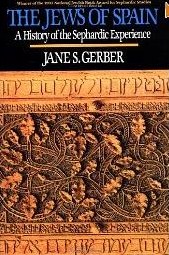Jane S. Gerber
Jews of Spain: A History of Sephardic Experience

Written by a Jew and addressed specifically to a Jewish audience, there's no question about it that -regardless of the importance and quality of this work- it is an exercise of Jewish apologetics as few have been consummated. And I don't mean it in a bad sense; a little more of the kind should be expected from other quarters: Christian, to look no further. Why, we have our own tragic story to tell, and no need to point to culprits now. But, in the present times, it seems that Christians are the easy scapegoat for all the evils done in the world. So this quality, in a sense, is something to be welcomed.
Now, in another order of things, the book is also meant for the general reader, but in a broader geographical context than just Spain. The author follows the main characters of her story along the shores of the Mediterranean, and has them mingle with the courts of Baghdad, Cairo, Palestine, etc. And this is the weak spot of the book: it is not a history, in my opinion, but a picking up of stories of prominent Jews who lived in the long time-span presented, and taking those cultural figures as an excuse to present a history "of the Jews" in general.
If one thing this book is not, that's a history of the Jews of Spain in general, for it is not a sociological history nor a historical description of the times, but a collection of achievements by the most outstanding figures of Jewish culture, all intellectuals, therefore not representative of a people as a whole. The people are not here, unless one assumes all were favored courtiers or collaborators.
The awkward position of the elite Jews in Muslim Spain is a subject that deserves historical research itself -and is only hinted at here- for they sure had to be very careful towards their fellow Jews so as not to be perceived as collaborators or apostates, while enjoying all the luxuries afforded by their embedded status within the Muslim courts. A life of consummate hypocrisy, aimed at keeping the best from both worlds: the appreciation and honor granted by the Jews in the persons of their rabbinical leaders, and the riches bestowed upon by the master Muslims. This delicate situation is best visualized when we come to read about the life of Maimonides. The author admits feeling astonishment as to how Maimonides "managed to survive there (in Morocco, the heartland of the fundamentalist Almohads) without converting. And she adds herself to other scholars' puzzle. A puzzle? A puzzle only scholars cannot put together.
It becomes even comical when one reads Maimonides' argument against martyrdom, as must have been suggested by other not-so-scholarly Jews at the time: "How much greater then, will be the reward of the Jews, who despite the exigencies of forced conversion perform commandments secretly." Secretly indeed. And to top if off: "He [Maimonides] divides Jewish precepts into those which must always be obeyed (e. g. the prohibition against murder) and those which may be violated if necessary." If the author didn't smell a rat here, then I proclaim I have lost all faith on scholars. As for the author, it was like this, watch it: "Probably, most of the Jews who endured the fury of the 1140s continued to practice a subterranean form of their faith, observing whatever they could in their homes while paying lip service to Islam." Isn't this contradictory with what the author just said about Maimonides, that one can violate some precepts if necessary? So how come it's only "lip-service"?
Contradictions abound in this book. Take for instance "Granada ... by 1066 the ibn Nagrelas, a family of Sephardic courtiers [one would think all Jews had rooms in the rulers' palaces] were so powerful that envious Muslims became enraged ... causing widespread destruction and Jewish flight." But, then again: "Yet Jews remained in the city even after the persecutions and continued to participate in all aspects of life until its fall in 1492." That "yet" says it all. The one thing that aggravates me a little is that the author seems to discount the possibility that those Jews who remained were willing -let's say it in modern terms- collaborators, while the rest, the common folk, stood true to their faith. But the common folk are exiled from this book; that's the aggravating thing. The hedonistic little world in which this elite class of Jews mingled has successfully claimed, through their scholarly successors, to be the victims of their oppressors, not the accomplices they really were. Saved by proxy.
As I say, the book did hint at many contradictions and relevant data, but never delves into any. Here's another instance: "[in the X and XI centuries] there were customs stations everywhere, but both Christian and Muslim powers seemed intent upon preserving a free-trade community in the Mediterranean." They were all very religious and pious, all right, but when it comes to making money, religion is put aside. But what does the author assume of this apparent contradiction? That those two centuries were a sign that Jews and Muslims were really getting along. Well, again, the money-minded elite was sure doing well. But how about the rest, didn't they exist?
In the best of times, all Jews and Christians had the same treatment by their "tolerant" Muslim oppressors: they were made to "pay the tribute readily, being brought low." (Sura 9:29). Being embedded with the oppressors sure helped.
I want to encourage the reading of this book, nevertheless. Read with a bit of critical reasoning it is enriching, and reads nicely. As I said at the beginning, I wish the West, with our cultural roots deep into Jewish, as well as Greek and Roman, civilizations, were more lenient and forgiving towards ourselves.
